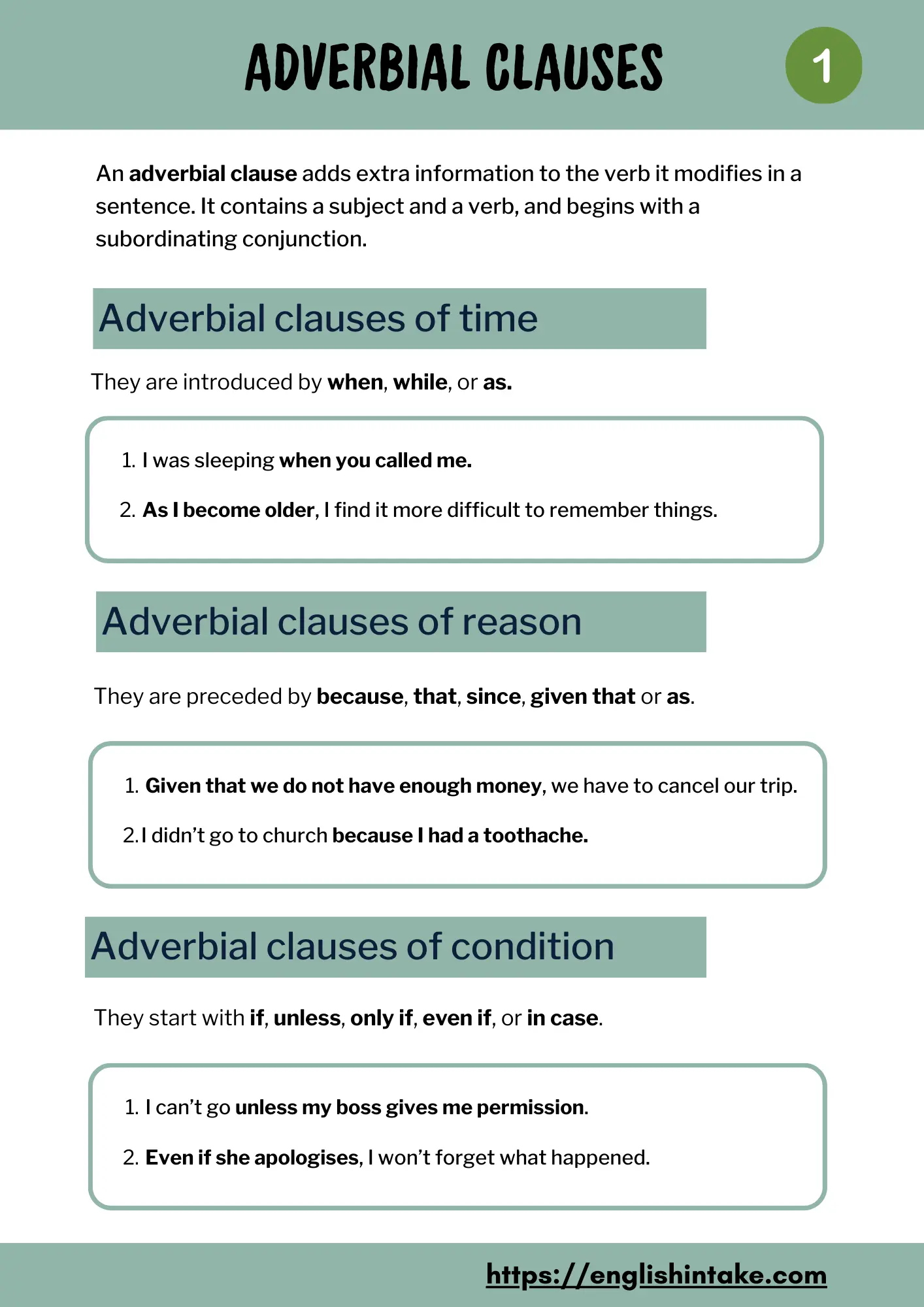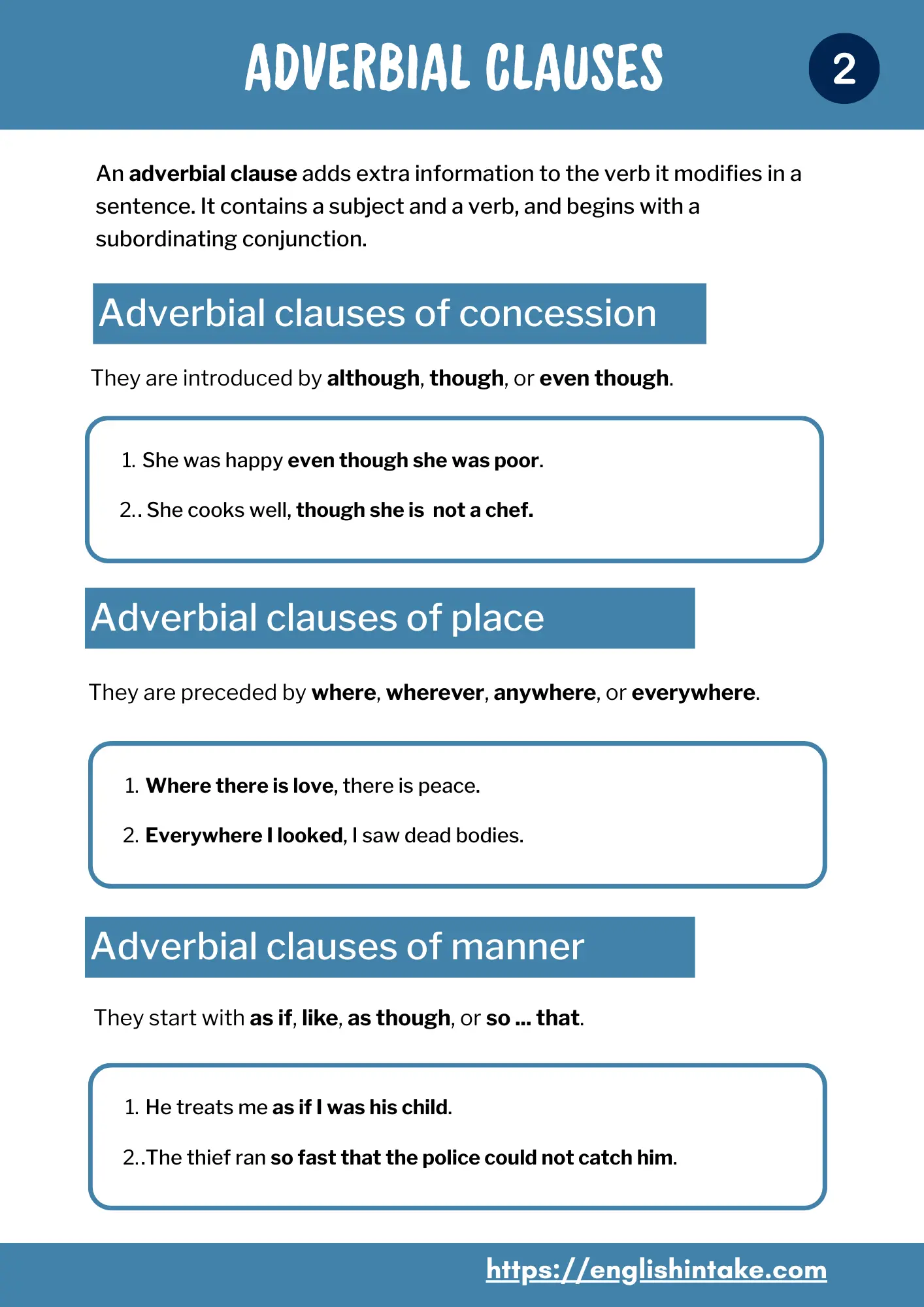1. Introduction to adverbial clauses
An adverbial clause functions as an adverb in a sentence. It gives more information about the verb it modifies. Unlike an adverb, it has a subject and a verb. An adverbial clause is a dependent clause. It needs another clause to form a complete sentence.
● Please close the door before you leave.
● After she finished her homework, she went out for a walk.
● Because it was raining, we decided to stay indoors.
● While I was cooking dinner, the phone rang.
● I won't lend you another book until you return the one I gave you.
● As soon as the bell rang, the students rushed out of the classroom.
● Even though he was tired, he continued to study for the exam.
● Whenever I visit New York, I make sure to see a Broadway show.
● If the weather clears up tomorrow, we will go to the beach.
● We have become very good friends since we met last year.
Unlike adverbs, adverbial clauses allow us to add more information and always include a verb and a subject. Adverbial clauses can be placed anywhere in a sentence.
2. Different types of adverbial clauses


- Adverbial clauses of time
- Adverbial clauses of reason
- Adverbial clauses of condition
- Adverbial clauses of concession
- Adverbial clauses of place
- Adverbial clauses of manner
2.1 Adverbial clauses of time
2.1.1 Time clauses with when, while, as
Adverbial clauses that begin with "when" are used to describe periods or points in time. When-clauses are also used to describe events that occur soon after another event in a different clause. In addition, they can highlight an event that interrupts another ongoing action. "When" can function like "if" in factual conditionals to discuss outcomes that consistently occur in response to specific situations or actions, similar to 'every time' something happens.
● We had just finished our exam when a student started to faint. (Sequential events)
● When the movie ended,everyone clapped. (A point in time)
● I was having lunch when you called me. (Interruptions)
● When demand increases, prices rise. (Factual conditional)
Note that "will" is not used with the when-clause. Thus, it is grammatically incorrect to say: "I will call you when I will arrive home." We can use "while" (meaning "during the period that") or "when" to describe a period of time. "While" is often used to link clauses where two actions occur simultaneously throughout the entire period.
● We went out when/while you were asleep.
● I was reading a book while she was shopping.
● I fell asleep while waiting for her at the train station.
● I took care of his pets while he was away.
The conjunction "as" can be used similarly to "when" and "while" to describe a period during which an event occurs. Additionally, "as" or "just as" can be used to highlight the exact moment an event takes place. "As" is also used to illustrate a relationship between one type of change over time and another.
● As I walked across the street, a car nearly knocked me out.
● The alarm rang just as the robbers stepped outside the shopping mall.
● As the plane was ready to depart, the front tyre burst.
● It started to rain just as we were ready to go out.
● As we become closer, I feel more secure in our relationship.
2.1.2 Time clauses with subordinating conjunctions (after, before, until, since, as soon as, whenever, etc.)
We use "after" to show that one event happens subsequent to another. It is often used with the present simple or the present perfect to indicate a completed action.
● After the movie ended, we went out for dinner.
● After I left the country, they sold my bicycle.
● Would you like to have lunch with us after you finish your meeting? (Not after you finish)
● We can go together after I have done my homework.
We use "before" to indicate that one action will be completed prior to another action.
● Before you leave, please make sure you close the window.
● I'll make sure he returns the keys before he leaves the office.
● She had left the office before I arrived.
● They had finished fixing the roof before the storm struck.
We use "until" to describe an action or state that continues up to a certain point in time.
● I won't speak to him again until he apologises.
● You can't go out until you have finished your homework.
● We'll wait until you come back.
● Let's not rest until we reach the mountain top.
We use "since" to indicate the point in time from which an action or state has continued. We use the present perfect or the past simple after "since".
● How long is it since you haven't talked to her?
● It's been 5 years since I retired.
● We haven't had any security issues since we moved here.
● I have worked here since I was twenty years old.
We use "once" to refer to an action that begins as soon as another action is completed. It acts as the starting point or the condition for another action to occur. We often use "once" with the present simple or the present perfect to indicate a completed action.
● Once you submit your application, you cannot make any changes.
● It's very easy once you get used to it.
● You won't stop reading once you have finished the first chapter of the book.
● Have you thought about what you would like to do once you have finished your study?
We can use "as soon as" to emphasise that an action occurs immediately after another.
● I rushed to the hospital as soon as I heard that my wife had given birth to our son.
● I will call him as soon as I finish my work.
● As soon as I arrive in Paris, I will send you a postcard.
● As soon as we make a decision, we will let you know.
We can use "by the time" to refer to a future point in time when another action will have been completed.
● By the time you wake up, I will have finished reading the book.
● By the time you get back, I will have cleaned the car.
● The robbers had left by the time the police arrived.
● By the time we arrived at the concert, many people were already there.
We use "whenever" to indicate any time or every time a certain situation occurs.
● I feel nervous whenever I go to the dentist.
● Whenever I visit Granada, I make sure to visit the Alhambra.
● We can leave whenever you are ready.
● Whenever you want to talk about it, just let me know.
We use "as long as" to specify that something will continue to happen provided that a certain condition is met. We use the present simple tense after "as long as" to indicate the future.
● You can use my car as long as you refill the gas.
● You can park here as long as you like.
● I won't forget what he did as long as I live.
● You are allowed to play here as long as you don't make too much noise.
"The moment (that)" is used in a similar way as "as long as" to emphasise that an action occurs immediately after another.
● The moment the bell rings, you’re allowed to leave.
● The moment you cheat on me, I will break up with you.
● Everyone must stand up the moment the president steps on stage.
● The moment I give you the signal, the race begins.
You can also use "the minute" or "the day" in a similar manner to "the moment". You can add "since" or "after" before the temporal conjunctions "the minute" or "the day".
● The day you lie to me, I won't trust you anymore.
● I stopped loving him the day he cheated on me.
● I have stopped loving him since the day he cheated on me.
● An e-mail will be automatically sent the minute you activate your subscription.
● We met again exactly one year after the first day we met.
2.2 Adverbial clauses of reason
Adverbial clauses of reason indicate why something happens. They are preceded by words like because, that, since, given that and as.
● I didn’t go to school today because I was sick.
● I won't trust him again because he lied to me once.
● Given that we have limited funding this year, we need to reduce our spending.
● As I already visited my parents last year, I decided to go somewhere else for vacation.
● As you were not there, we started without you.
● Since it was raining, we cancelled the picnic.
2.3 Adverbial clauses of condition
Adverbial clauses of condition state conditions under which something happens. They often start with if, unless, only if, even if, and in case.
● If it rains, we will stay inside.
● You can't succeed unless you try.
● I will go only if you come with me.
● Even if it's cold, I'll go jogging.
● If you heat ice, it melts.
● She will be upset unless you apologise to her.
● In case you need me, I'll be in my office.
● If you park here again, you will be fined.
● He wouldn't have accepted even if I had offered him a fortune.
● Bring a coat in case it gets cold.
2.4 Adverbial clauses of concession
Adverbial clauses of concession express a contrast or an exception, introduced by although, though, and even though.
● Although it was raining, we went for a walk.
● She was happy even though she lost the game.
● He is playing well, though he doesn't have much experience.
● He likes her even though she can be rude sometimes.
● Although he's rich, he lives humbly.
● Though the bed was small, it was very comfortable.
● Even though we arrived late, they allowed us to get inside.
● She went out though it was cold.
2.5 Adverbial clauses of place
Adverbial clauses of place tell us where an action occurs. They are typically introduced by where, wherever, anywhere, and everywhere.
● He followed her wherever she went.
● You can sit where you like.
● Where there is love, there is life.
● I will follow you wherever you go.
● She went to a place where no one had gone before.
● I applied for positions anywhere I could.
● She found her keys where she left them.
● Everywhere I looked, everyone looked scared.
2.6 Adverbial clauses of manner
Adverbial clauses of manner provide details about the way in which something happens. They are preceded by words like as if, like, as though, and so ... that.
● He looked at me as if he had seen a ghost.
● They fought like cats and dogs.
● He whispered like someone telling a secret.
● He talked to me as if he were my boss.
● They acted as though they already knew what I was going to say.
● He spoke so softly that we could barely hear him.
● They worked so efficiently that the project was completed ahead of schedule.
